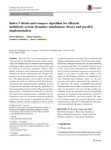Index-3 divide-and-conquer algorithm for efficient multibody system dynamics simulations: theory and parallel implementation

Use este enlace para citar
http://hdl.handle.net/2183/34536
A non ser que se indique outra cousa, a licenza do ítem descríbese como Attribution 4.0 International
Coleccións
- LIM - Artigos [52]
Metadatos
Mostrar o rexistro completo do ítemTítulo
Index-3 divide-and-conquer algorithm for efficient multibody system dynamics simulations: theory and parallel implementationData
2019Cita bibliográfica
Malczyk, P., Frączek, J., González, F., Cuadrado J.. Index-3 divide-and-conquer algorithm for efficient multibody system dynamics simulations: theory and parallel implementation. Nonlinear Dyn 95, 727–747 (2019). https://doi.org/10.1007/s11071-018-4593-3
Resumo
[Abstract] There has been a growing attention to efficient simulations of multibody systems, which is apparently seen in many areas of computer-aided engineering and design both in academia and in industry. The need for efficient or real-time simulations requires high fidelity techniques and formulations that should significantly minimize computational time. Parallel computing is one of the approaches to achieve this objective. This paper presents a novel index-3 divide-and-conquer algorithm for efficient multibody dynamics simulations that elegantly handles multibody systems in generalized topologies through the application of the augmented Lagrangian method. The proposed algorithm exploits a redundant set of absolute coordinates. The trapezoidal integration rule is embedded into the formulation and a set of nonlinear equations need to be solved every time instant. Consequently, the Newton–Raphson iterative scheme is applied to find the system coordinates and joint constraint loads in an efficient and highly parallelizable manner. Two divide-and-conquer based mass-orthogonal projections are performed then to circumvent the effect of constraint violation errors at the velocity and acceleration level. Sample open- and closed-loop multibody system test cases are investigated in the paper to confirm the validity of the approach. Challenging simulations of multibody systems featuring long kinematic chains are also performed in the work to demonstrate the robustness of the algorithm. The details of OpenMP-based parallel implementation on an eight-core shared memory computer are presented in the text and the parallel performance results are extensively discussed. Significant speedups are obtained for the simulations of small- to large-scale multibody open-loop systems. The mentioned features make the proposed algorithm a good general purpose approach for high-fidelity, efficient or real-time multibody dynamics simulations.
Palabras chave
Divide-and-conquer algorithm
Multibody dynamics
Real-time simulation
Mass-orthogonal projections
Trapezoidal rule
Parallel computing
Long chain simulation
Algoritmo divide-and-conquer
Dinámica multicuerpo
Simulación en tiempo real
Proyecciones ortogonales
Regla trapezoidal
Computación paralela
Simulación de cadenas largas
Multibody dynamics
Real-time simulation
Mass-orthogonal projections
Trapezoidal rule
Parallel computing
Long chain simulation
Algoritmo divide-and-conquer
Dinámica multicuerpo
Simulación en tiempo real
Proyecciones ortogonales
Regla trapezoidal
Computación paralela
Simulación de cadenas largas
Versión do editor
Dereitos
Attribution 4.0 International
ISSN
1573-269X






